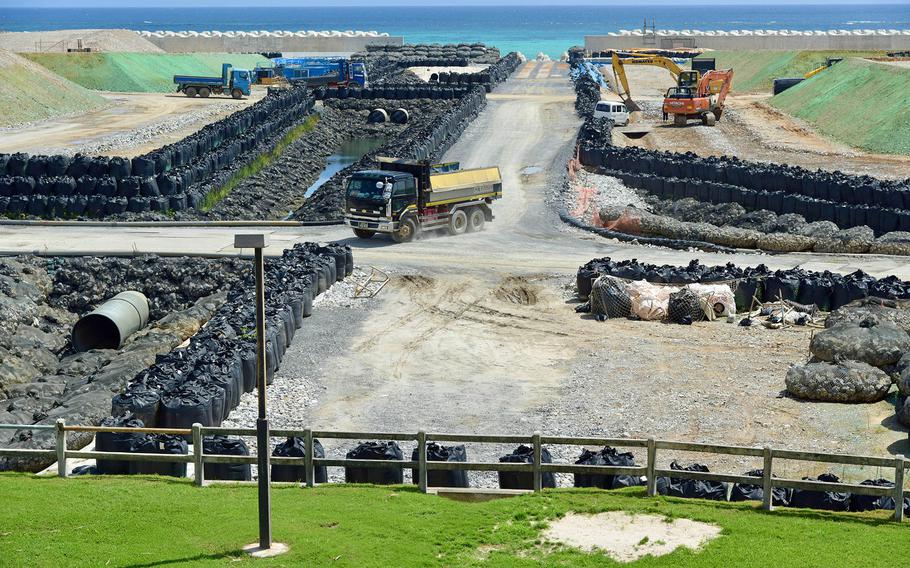
Construction work continued on a Marine Corps runway at Camp Schwab, Okinawa, on Sept. 15, 2022. (Frank Andrews/Stars and Stripes)
CAMP FOSTER, Okinawa — A Japanese Cabinet minister is expected to signal a return to work on a Marine Corps runway at Camp Schwab on Thursday, three days after Okinawa Gov. Denny Tamaki ignored a court order to approve construction changes himself.
Japanese Minister of Land, Infrastructure, Transport and Tourism Tetsuo Saito notified Okinawa prefecture on Tuesday morning that Saito by proxy on Thursday will approve 3½-year-old requests for permits for construction changes at the airfield, a spokesman for the ministry’s Water and Disaster Management Bureau told Stars and Stripes by phone Tuesday.
The runway being built on reclaimed land in Oura Bay in the rural Henoko area of Okinawa is a planned replacement for Marine Corps Air Station Futenma in urban, densely populated Ginowan.
A copy of Saito’s letter was sent via email Tuesday morning; the original letter is expected to arrive at the Okinawa prefectural government offices on Wednesday afternoon. The ministry spokesman called Tamaki’s refusal “truly regrettable.”
Some government officials in Japan may speak to the media only on condition of anonymity.
Tamaki may take the case again to Japan’s Supreme Court, he said in a statement posted Monday on the prefecture’s website. The court in September ruled against him on nearly the same question.
“There are various problems with the judgment, and I decided it was difficult to give the approval as a governor entrusted by many prefectural citizens who oppose the construction of Henoko new base,” he wrote Monday.
The prefecture plans to file another appeal with the Supreme Court by Wednesday, a spokesman for the prefecture’s Henoko Base Construction Countermeasures Division said by phone Tuesday.
Tamaki, who opposes the U.S. military presence in Okinawa, in November 2021 denied the pending requests for permits at Schwab but was overruled by Saito, who deemed the governor’s decision “illegal and unreasonable.”
Tamaki began a protracted legal battle, filing and losing three suits to block the permits, culminating in the September loss at the Supreme Court.
The governor continued to refuse the permits and the Fukuoka High Court, Naha branch, on Dec. 20 ruled again in Saito’s favor and ordered Tamaki to approve the permits by Monday.
Appealing to the Supreme Court cannot halt the construction. Japan’s Local Autonomy Act states that the latest decision by the Fukuoka High Court remains in effect unless the Supreme Court overturns the ruling.
Tamaki argues that the soft seabed in the construction zone poses a hazard and that Tokyo had failed to consider the environmental impact on the endangered dugong, a cousin of the manatee protected by Japanese law.
The Sankei Shinbun, citing unnamed sources at Japan’s Ministry of Defense, reported Tuesday that the reclamation work on Oura Bay will resume on Jan. 12.
A spokesman for the Defense Bureau, which represents the Defense Ministry in the prefecture and had asked for the construction changes, declined to provide the starting date of the reclamation work when reached by phone Tuesday.